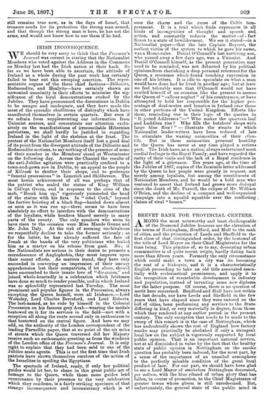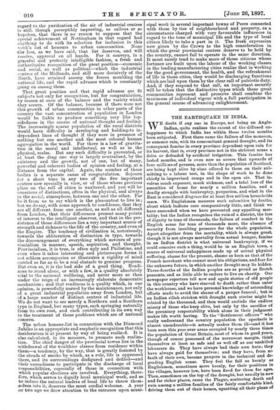BREVET RANK FOR PROVINCIAL CENTRES.
AMONG the most noteworthy and least challengeable - of the Diamond Jubilee honours are the elevation of the towns of Nottingham, Bradford, and Hull to the rank of cities, and the promotion of Leeds and Sheffield to the first class of that distinguished order, by the bestowal of the title of Lord Mayor on their Chief Magistrates for the time being. This practice of, so to say, decorating urban communities is of quite recent origin, hardly dating back more than fifteen years. Formerly the only circumstance which could make a town a city was its becoming the seat of a bishopric, and it is a characteristically English proceeding to take an old title associated essen- tially with ecclesiastical prominence, and apply it to the recognition of remarkable development in industry and population, instead of inventing some new diploma for the latter purpose. Of course, there is no question of merit here concerned. Bradford and Hull have not within the last decade, nor have Leeds and Sheffield in the few years that have elapsed since they were entered on the- roll of cities, been performing any services to the State differing in kind, or very materially in degree, from those which they rendered at any earlier period in the present century. The only exception that needs to be made to the sweep of this remark is in the case of Nottingham, which has undoubtedly shown the rest of England how factory smoke may practically be abolished if only a stringent local law on the subject is vigorously supported by local public opinion. That is an important national service, not at all diminished in value by the fact that the healthy state of public opinion in Nottingham on the smoke question has probably been induced, for the most part, by a sense of the importance of an unsoiled atmosphere to the perfectly saleable condition of the great local. product of lace. For our part, we should have been glad to see a Lord Mayor of smokeless Nottingham decorated, per saltum, with the blue riband of urban glory that has fallen, in course of promotion, to the Chief Magistrates of greater towns whose gloom is still unredeemed. But, unfortunately, the general state of the public mind in regard to the purification of the air of industrial centres is still, though perceptibly improving, so callous or so bopeless, that there is no reason to suppose that the special achievement of Nottingham in that regard had anything to do with its selection for inclusion in this week's list of honours to urban communities. None the less, as we have said, that list deserves, and will receive, approval on all hands. For it conveys, in a graceful and perfectly intelligible fashion, a fresh and authoritative recognition of the great position—economic and social, as well as political—which the industrial -centres of the Midlands, and still more decisively of the North, have attained among the forces moulding the national life, and the rapid advance which is constantly _going on among them.
That great position and that rapid advance are fit subjects not only for recognition, but for congratulation, by reason at once of the balance and the variety which they secure. Of the balance, because if there were not this growth of urban communities in other parts of the -country the vast concentration of population in London would be liable to produce something very like lop- sidedness in the course of national thought and feeling.
The increasingly sparse population of the rural districts would have difficulty in developing and holding-to in- dependent lines of thought if they were in presence of nothing but one another and the most colossal human aggregation in the world. For there is a law of gravita- tion in the moral and intellectual, as well as in the physical, realm. But any such difficulty is prevented, or at least the drag one way is largely neutralised, by the existence and the growth, not of one, but of many, powerful and coherent bodies of opinion and feeling, at a distance from the capital. Again, the number of those 'bodies is a separate cause of congratulation. Sojourn for a short time in any two of the five important centres now specially in view, or of those whose previous place on the roll of cities is unaltered, and you will be conscious of distinctions, often in the physical, and always in the social, atmosphere, between one and the other. Far be it from us to say which is the pleasantest to live in; but we do say, with some approach to confidence, that they are all different from one another, as well as all different from London, that their differences present many points of interest to the intelligent observer, and that in the per- sistence of those differences lies a very important source of strength and richness to the life of the country, and even of the Empire. The tendency of civilisation is, notoriously, towards the obliteration of distinction in type, towards the discouragement of everything which savours of pro- vincialism in manner, speech, aspiration, and thought. Provincialism, it is true, is often ugly and Philistine, and -even when it takes interesting and picturesque forms it not seldom accompanies or illustrates a rigidity of mind -carried so far as to be a real obstacle to genuine progress. But even so, it is the bad side of a good thing. Readi- ness to stand alone, or with a few, is a quality absolutely vital to the national wellbeing, and never more so than under the reign of an increasingly elaborate democratic mechanism ; and that readiness is a quality which, in our opinion, is powerfully nursed by the maintenance, not only of a great industrial population away from London, but of a large number of distinct centres of industrial life. We do not want to see merely a Northern and a Southern type in England, but many types, each springing naturally from its own root, and each contributing in its own way to the treatment of those problems which are of national -concern.
The urban honour-list in connection with the Diamond Jubilee is an appropriate and emphatic recognition that this desideratum is at present by way of being realised. It is also calculated, in its measure, to promote such realisa- tion. The chief danger of the provincial towns lies in the withdrawal of the wealthier classes from residence within them—a tendency, by the way, that is greatly fostered by the clouds of smoke by which, as a rule, life is oppressed there, and its surroundings disfigured and defiled—and their unreadiness to participate in the discharge of local responsibilities, especially of those in connection with 'which popular elections are involved. Everything, there- fore, which serves to dignify local municipal work, and so to induce the natural leaders of local life to throw them- selves into it, deserves the most cordial welcome. A year or two ago we drew attention to the entrance upon muni- cipal work in several important towns of Peers connected with them by ties of neighbourhood and property, as a circumstance charged with- very favourable influences in regard to the tone of municipal life and the type of local citizen likely to take a part in it. The fresh expression now given by the Crown to the high consideration in which the great provincial centres deserve to be held by the country, cannot fail to operate in the same direction. It must surely tend to make more of those citizens whose fortunes are built upon the labour of the working classes in the leading manufacturing cities realise that in working for the good government, the health, and the refreshment of life in those cities, they would be discharging functions which are laid upon them by the clear call of patriotic duty. And, if they respond to that call, an important security will be taken that the distinctive types which these great communities represent and preserve shall combine the maximum of individual vigour with a full participation in the general course of advancing enlightenment.



















































 Previous page
Previous page